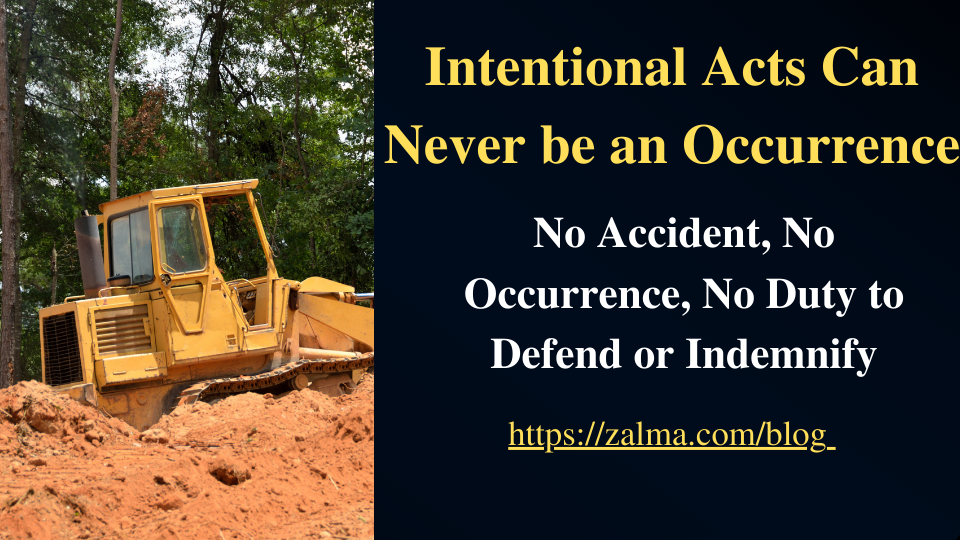-
News Feed
- EXPLORE
-
Pages
-
Groups
-
Events
-
Blogs
-
Marketplace
-
Offers
-
Jobs
-
Developers
Intentional Act Can Never Be an Occurence

Intentional Acts Can Never be an Occurrence
Read the full article at https://www.linkedin.com/feed/update/urn:li:ugcPost:6922159150286200833?updateEntityUrn=urn%3Ali%3Afs_updateV2%3A%28urn%3Ali%3AugcPost%3A6922159150286200833%2CFEED_DETAIL%2CEMPTY%2CDEFAULT%2Cfalse%29 and at https://zalma.com/blog plus more than 4150 posts.
Posted on April 19, 2022 by Barry Zalma
No Accident, No Occurrence, No Duty to Defend or Indemnify
Intentionally cutting trees on the neighbors’ land, even if the insured acted on the good faith, but mistaken belief, that the trees were on her land, is not an accident for purposes of insurance coverage. In Maryam Ghukasian v. Aegis Security Insurance Company, B311310, California Court of Appeals, Second District, Fourth Division (April 14, 2022) the California Court of Appeal explained the difference between intentional acts and accidents required for there to be an occurrence for which a defense is required.
Ghukasian owns a home in Glendale, California. Ghukasian purchased a homeowner’s policy from Aegis. In August 2018, while the policy was in effect, she hired contractors to level land and clear trees on land she understood to be a part of her property. The land Ghukasian’s contractor cleared and leveled was not owned by Ghukasian, however, but by Ghukasian’s neighbors, Vrej and George Aintablian (collectively, the neighbors).
The neighbors sued . Aegis denied coverage for the underlying action on the ground it owed no duty to defend because the complaint alleged intentional (as opposed to accidental) conduct and various exclusions in the policy barred coverage.
DISCUSSION
On summary judgment, to prevail on the duty to defend issue, the insured must prove the existence of a potential for coverage, while the insurer must establish the absence of any such potential.
Ghukasian’s intentional conduct was the immediate cause of the injury; there was no additional, independent act that produced the damage. Therefore, the Liberty Surplus Ins. case did not control.
Because the acts for which the neighbors seek to impose liability on Ghukasian were not accidental Ghukasian is not entitled to coverage and therefore, her claims for breach of contract and declaratory relief fail as a matter of law, her bad faith claim also fails.
The judgment was affirmed and Aegis was awarded its costs on appeal.
The court, not bound by the eight corners rule that applies in some jurisdictions, interpreted the policy and facts as alleged, all of which were intentional conduct and concluded that there was no potential of an accident causing the damage.
(c) 2022 Barry Zalma & ClaimSchool, Inc.
Barry Zalma, Esq., CFE, is available at http://www.zalma.com and [email protected].
Subscribe to Zalma on Insurance at locals.com https://zalmaoninsurance.local.com/subscribe.
Subscribe to Excellence in Claims Handling at https://barryzalma.substack.com/welcome.
We are 100% funded for October.
Thanks to everyone who helped out. 🥰
Xephula monthly operating expenses for 2024 - Server: $143/month - Backup Software: $6/month - Object Storage: $6/month - SMTP Service: $10/month - Stripe Processing Fees: ~$10/month - Total: $175/month
- Art
- Causes
- Crafts
- Crime
- Dance
- Drinks
- Film
- Finance
- Fitness
- Food
- Games
- Gardening
- Health
- Home
- Literature
- Music
- Networking
- Paranormal
- Other
- Politics
- History
- News
- Party
- Science
- Religion
- Shopping
- Sports
- SyFy
- Politically Incorrect
- Philosophy
- Theater
- Technology
- Wellness



